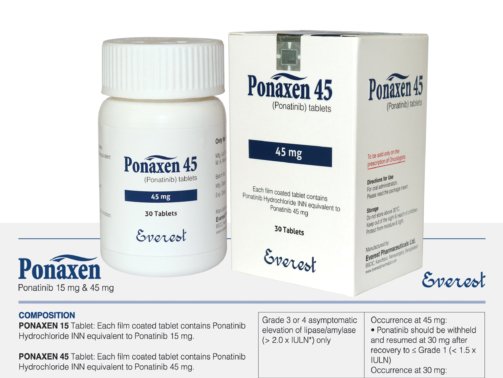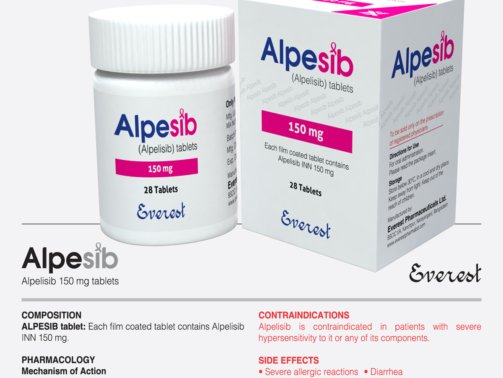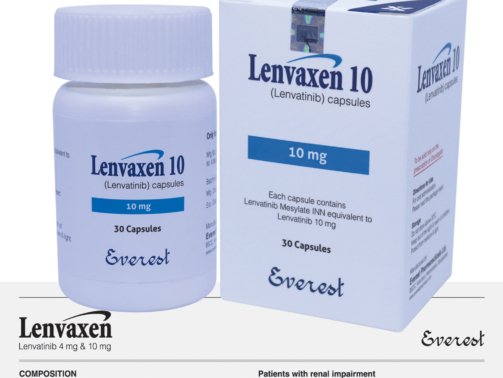Tofacitinib (Xeljanz) 11 Mg
0.00$
Tofacitinib is a Janus kinase (JAK) inhibitor. JAKs are intracellular enzymes which transmit signals arising from cytokine or growth factor-receptor interactions on the cellular membrane to influence cellular processes of hematopoiesis and immune cell function. Within the signaling pathway, JAKs phosphorylate and activate Signal Transducers and Activators of Transcription (STATs) which modulate intracellular activity including gene expression. Tofacitinib modulates the signaling pathway at the point of JAKs, preventing the phosphorylation and activation of STATs. JAK enzymes transmit cytokine signaling through pairing of JAKs (e.g., JAK1/JAK3, JAK1/JAK2, JAK1/TyK2 and JAK2/JAK2). Tofacitinib inhibited the in vitro activities of JAK1/JAK2, JAK1/JAK3, and JAK2/JAK2 combinations with IC50 of 406, 56, and 1377 nM, respectively. However, the relevance of specific JAK combinations to therapeutic effectiveness is not known.
Tofacitinib is an oral drug used to treat a number of inflammatory and autoimmune diseases. It is sold under the trade name Xeljanz. Patients with chronic conditions can benefit from the simplicity of the once-daily dose of the 11 mg extended-release (XR) tablet. Tofacitinib belongs to a class of medications known as Janus kinase (JAK) inhibitors, which change immune system function to lower inflammation and halt the progression of disease.
Mechanism of Action
Janus kinase enzymes, specifically JAK1 and JAK3, which are implicated in the signaling pathways of many cytokines and growth factors crucial to the immune response, are selectively inhibited by tofacitinib. Tofacitinib lowers the hyperactive immune response that causes autoimmune illnesses such as psoriatic arthritis (PsA), ulcerative colitis (UC), and rheumatoid arthritis (RA) by blocking these pathways.
This specific mechanism enables tofacitinib to reduce mucosal inflammation in ulcerative colitis and inflammation, discomfort, and joint damage in disorders associated to arthritis.
Indications and Usage
Adults with the following conditions may benefit from taking Xeljanz 11 mg extended-release tablets:
Rheumatoid arthritis (RA): Individuals with moderately to severely active RA who have either become intolerant to methotrexate or have not reacted well to it.
Adults with active psoriatic arthritis (PsA) who have not reacted well to other disease-modifying antirheumatic medications (DMARDs) comprise this population.
Patients who have not reacted effectively to tumor necrosis factor (TNF) inhibitors may have moderate to severe active ulcerative colitis (UC).
In contrast to the immediate-release 5 mg tablet, which is normally given twice day, the extended-release 11 mg tablet is usually administered once daily.
Dosage and Administration
For the extended-release formulation, 11 mg taken orally once daily, with or without food, is the normal suggested dosage. Splitting, crushing, or chewing the pill could change its release characteristics, so it is best to consume it whole.
Because tofacitinib may alter lipid levels, liver function, and blood counts, it is imperative to adhere to the prescription doctor’s instructions and have frequent monitoring throughout therapy.
Warnings and Precautions
Tofacitinib (Xeljanz) 11 Mg carries several important warnings:
Serious Infections: There is an increased risk of serious infections, including tuberculosis (TB), fungal infections, and other opportunistic infections. Patients should be screened for TB before starting therapy and monitored during treatment.
Malignancies: Long-term use may increase the risk of certain cancers, such as lymphoma and lung cancer.
Thrombosis: Tofacitinib has been associated with an increased risk of blood clots, including deep vein thrombosis (DVT) and pulmonary embolism (PE), especially at higher doses.
Cardiovascular Events: There may be a heightened risk of major adverse cardiovascular events (MACE), including myocardial infarction and stroke.
Laboratory Abnormalities: Tofacitinib can cause changes in blood cell counts, liver enzymes, and lipid levels. Regular blood work is necessary.
Due to these risks, the U.S. FDA requires a boxed warning on all JAK inhibitors, including Xeljanz.
Contraindications
Patients should not use tofacitinib if they have:
Hypersensitivity to the medication or any of its ingredients that is known
Serious, ongoing diseases (such sepsis or active tuberculosis)
Patients who are elderly, have a history of cancer, or have risk factors for thrombosis or cardiovascular disease should use caution.
Drug Interactions
The liver enzyme CYP3A4 is the main enzyme responsible for tofacitinib metabolism, with CYP2C19 playing a smaller role. Use caution when paired with:
Tofacitinib levels may rise in response to CYP3A4 inhibitors, such as ketoconazole.
Inducers of CYP3A4, such as rifampin, may reduce efficacy.
Additional immunosuppressive medications: A higher chance of infection or side effects.
To prevent negative interactions, patients should disclose any medications and supplements they are taking to their healthcare professionals.
Side Effects
Common side effects of tofacitinib may include:
Headache
Diarrhea
Nasopharyngitis
Elevated liver enzymes
Increased cholesterol levels
Serious but less common side effects can include:
Serious infections
Blood clots
Gastrointestinal perforations
Cancer
Patients should report unusual symptoms such as shortness of breath, chest pain, swelling in the legs, or persistent fever to their doctor promptly.
Patient Considerations
Prior to using 11 mg XR of Xeljanz, patients should have:
TB examination
Testing for hepatitis B and C
Blood tests to assess lipid profile, liver function, and complete blood count
Since live immunizations should be avoided while receiving treatment, vaccinations should be updated prior to starting therapy.
Conclusion
For the treatment of autoimmune illnesses such as UC, PsA, and RA, 11 mg extended-release tablets of tofacitinib (Xeljanz) provide a once-daily oral option. Despite being good at lowering inflammation and enhancing quality of life, it needs to be well watched because of the possible dangers of infection, heart problems, and cancer. To ensure the safe and efficient use of this potent drug, patients must collaborate closely with their healthcare practitioners.
Order Now At Mdx Pharma bd….
To order from MDX Pharma BD, visit their website at https://mdxpharmabd.com, where you can browse products and place orders online. For inquiries or orders via email, contact emedicarepharma@gmail.com. Alternatively, call (+88) 01929123476. Their address is 29, Abdullahpur, Uttara, Dhaka-1230, Bangladesh.
1. What is the purpose of Tofacitinib (Xeljanz) 11 mg?
Adults with moderate to severe ulcerative colitis are treated with tofacitinib 11 mg. It aids in managing symptoms like diarrhea, rectal bleeding, and stomach pain as well as lowering colon inflammation.
2. How does Tofacitinib work?
Tofacitinib is a Janus kinase (JAK) inhibitor. It blocks specific enzymes involved in the body’s immune response, helping reduce inflammation and symptoms in autoimmune conditions.
3. How is the dose of 11 mg taken?
Xeljanz 11 mg is typically used once day, with or without meals, as prescribed by your doctor. The tablet should be swallowed whole, without chewing or crushing it.
4. Is using it while pregnant or nursing safe?
The safety of tofacitinib during lactation and pregnancy is not fully known. In general, it is not recommended unless the benefits outweigh the risks. Talk about it with your doctor.
5. What is the duration of action of tofacitinib?
While complete results may take up to eight weeks, some people may experience improvement in as little as a few weeks. Follow-up and consistent use are essential.

 Cart is empty
Cart is empty 



